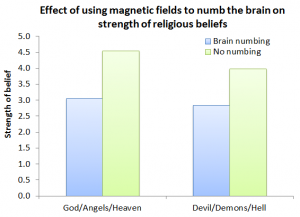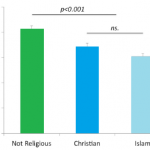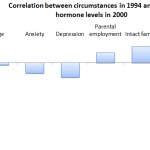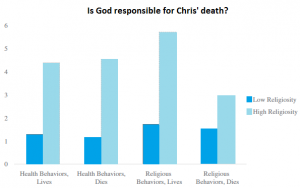By using a carefully calibrated magnetic field, you can change the patterns of brain activity. It should come as no surprise, then, that you can actually change the intensity of religious beliefs in this way, at least temporarily.
For example, a recent study found that activating the brain’s parietal lobe (the bit near the top of your head just behind the middle) can make people less religious, probably by sharpening their sense of location (and separation from the wider universe).
 But we also know that another region called the prefrontal cortex is important in religious belief, and that’s interesting because it’s a region that’s responsible for a lot of high-level processing – decision making, social interactions, and so on.
But we also know that another region called the prefrontal cortex is important in religious belief, and that’s interesting because it’s a region that’s responsible for a lot of high-level processing – decision making, social interactions, and so on.
Colin Holbrook, at UCLA in the USA, and colleagues want to know if they could tweak the religious response to threatening situations using magnetic stimulation of the prefrontal cortex.
In their study, 38 students were asked to write a few sentences on the subject of their own death. It’s been shown in previous studies that reminding people of their mortality has a number of effects, including strengthening their religious belief.
Then they used a technique called transcranial magnetic stimulation (TMS) to disrupt brain activity in the prefrontal cortex area. The result, as you can see from the graph, is that the strength of religious belief in those who received TMS was lower than in those who did not.
Now, this wasn’t simply a case of reduced brain activity resulting in reduced beliefs of all kind. As part of the same study they also assessed positive attitudes towards foreigners. It increased in those who received TMS.
One possible explanation of these results is that the brain deals with threatening situations by turning to comforting ‘truths‘ – a response known as worldview defence. The idea is that, if you feel threatened, you cling onto beliefs like religion and the rejection of people of different cultures. This response happens in the prefrontal cortex, and the TMS blocks it.
The researchers acknowledge this a a possible explanation, but prefer a different one.
They suggest that what is happening is not a general worldview response, but rather generating specific ‘solutions’ to specific problems. So, get reminded of death – solution is to believe in life after death.
Their evidence for this is that, the effect on belief in Devils/Demons/Hell was not statistically significant, unlike the effect on God/Angels/Heaven. However, a glance at the graphic will tell you that the size of the effect was pretty similar – so it’s probable that the study was simply underpowered to do the kind of analysis they want (and that’s a common problem in psychology studies).
But, regardless of the precise mechanism, it’s clear that something is going on in the prefrontal cortex that ramps up religious belief in response to threatening situations, like being reminded of your mortality.
![]()
Holbrook, C., Izuma, K., Deblieck, C., Fessler, D., & Iacoboni, M. (2015). Neuromodulation of Group Prejudice and Religious Belief Social Cognitive and Affective Neuroscience DOI: 10.1093/scan/nsv107















